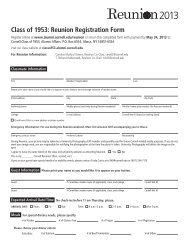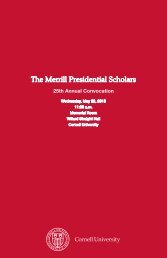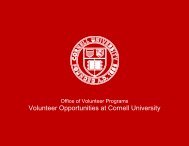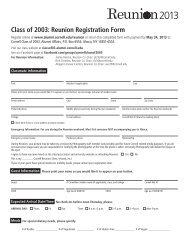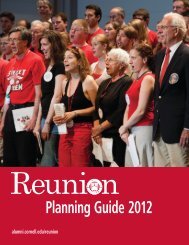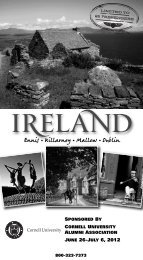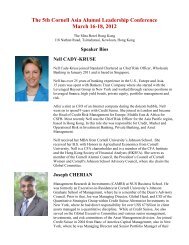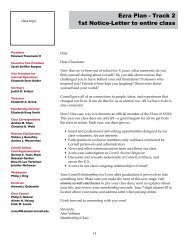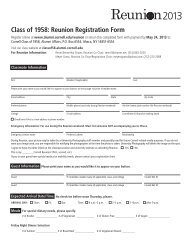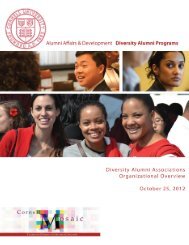Turning 20! - Alumni - Cornell University
Turning 20! - Alumni - Cornell University
Turning 20! - Alumni - Cornell University
You also want an ePaper? Increase the reach of your titles
YUMPU automatically turns print PDFs into web optimized ePapers that Google loves.
HISTORY 2<br />
gave me the chance to focus on something I really cared about: women’s<br />
leadership.” By 1997 she was chair of PCCW and in ’98, an alumnielected<br />
trustee.<br />
Of course, the entire PCCW scenario to date has played out with<br />
starts and stops along the path, as goals, personalities, priorities<br />
and <strong>University</strong> leadership inevitably changed. Yet an assessment<br />
after <strong>20</strong> years provides ample evidence that <strong>Cornell</strong> owes part of<br />
its 21st Century confidence and certitude to the achievements of<br />
its women. In return, many of those same women are exceedingly<br />
grateful for the opportunities Pres. Rhodes and <strong>Cornell</strong> opened to<br />
them back in 1989 and 1990. *<br />
*Our pre-PCCW history draws heavily on an essay, “From Stuffing Envelopes<br />
to Founding PCCW: Lilyan H. Affinito and Patricia Carry Stewart,” written<br />
before PCCW’s 10th Anniversary by Cindy C. Froggatt, MS Hum Ec’85, PCCW<br />
1994. Thanks to Cindy for making it available.<br />
Did You Know<br />
The “Harvard Annex”, the forerunner of Radcliffe College,<br />
was founded as a private program in 1879 to enable Harvard<br />
Faculty to instruct women. It was incorporated in 1882 as the<br />
Society for the Collegiate Instruction of Women and housed with<br />
a private family. Harvard merged with Radcliffe in 1977 and<br />
completed “full integration” in 1999.<br />
Getting Started: Is This a Good Idea<br />
Once the President’s Council of <strong>Cornell</strong> Women (PCCW)<br />
concept was deemed interesting and attractive, its founding<br />
Steering Committee had plenty to do. This assessment came after a<br />
luncheon meeting in Fall 1989 at the <strong>Cornell</strong> Club on Manhattan’s<br />
East 44th Street which was barely finished and not yet officially<br />
opened. At the luncheon, host and <strong>Cornell</strong> President Frank Rhodes<br />
described the PCCW concept to a group of active and potentially<br />
active professional alumnae, <strong>20</strong> of whom volunteered for its Steering<br />
Committee (see story under Alumnae)<br />
“Prior to the President’s organizational meeting, I was asked to<br />
chair a Steering Committee to determine whether there was real<br />
interest and viability to a PCCW,” explains Judith H. Monson,<br />
then Vice President-Finance for Seagram International, who<br />
subsequently became PCCW’s founding chairman. The Steering<br />
Committee’s first mandate was, “Is this a good idea” Guided<br />
by the Steering Committee’s fact-finding and planning, Judy<br />
prepared a report for President Rhodes recommending that PCCW<br />
be established. A spring 1990 meeting in Ithaca followed to launch<br />
this new alumnae organization and plan for the first membership<br />
meeting that October in New York City.<br />
Accomplishments that first year were many, including:<br />
establishing the PCCW officers (Steering Committee) and bylaws;<br />
refining the mission and goals; selecting and recruiting 110<br />
charter members; and forming task forces geared to its mission --<br />
Leadership & Role Models (career planning, mentoring); Quality of<br />
Life (campus safety, women athletics and other campus issues), and<br />
Women Faculty & Administration (recruitment and retention). As<br />
Judy Monson, writes from her current post as Vice Counsel at the<br />
US Embassy in Bogotá, “The rest is history.” Moreover, these initial<br />
accomplishments that Judy sites serve as a reasonably reliable<br />
roadmap for the years that followed.<br />
Original Mission<br />
To advance the involvement and leadership of women students,<br />
faculty, staff and alumnae within <strong>Cornell</strong> <strong>University</strong> and its<br />
many constituent communities, and to advise the President on<br />
issues related to women.<br />
For carrying out its mission, PCCW membership was largely<br />
reserved for graduates who were not active alumnae.<br />
Core Mission Still Strong<br />
Reviewing the <strong>20</strong> years since PCCW launched a new era of<br />
opportunity and challenge for <strong>Cornell</strong> women, it is clear that the<br />
mission of PCCW remains strong. The following overview of those<br />
years presents highlights of how the organization has worked,<br />
assessments of its accomplishments, and how successful it has been<br />
in carrying out Lilyan and Pat’s original vision, with a mission that<br />
has changed relatively little during those <strong>20</strong> years.<br />
Original Steering Commitee, Jan. 1990<br />
Lilyan Affinito<br />
Randy Allen<br />
Judith Monson<br />
Marlene Jupiter<br />
Judith Brandenburg<br />
Susan Robbins<br />
Carol MacCorkle<br />
Barbara Friedman<br />
Patricia Carry Stewart<br />
Ann Morrissey Merick<br />
Nancy Hall<br />
Elizabeth Harrington<br />
Marjorie Blanchard<br />
K. Shelley Porges<br />
Carolyn Press Landis<br />
Pamela Clement<br />
Murem Sharpe<br />
Ronay Menschel<br />
Blonde Grayson Hall<br />
Lenore Weitzman<br />
For readers interested in details of PCCW programming from various<br />
two-year segments, see the Timelines on the PCCW Website: http://alumni.<br />
cornell.edu/PCCW)



